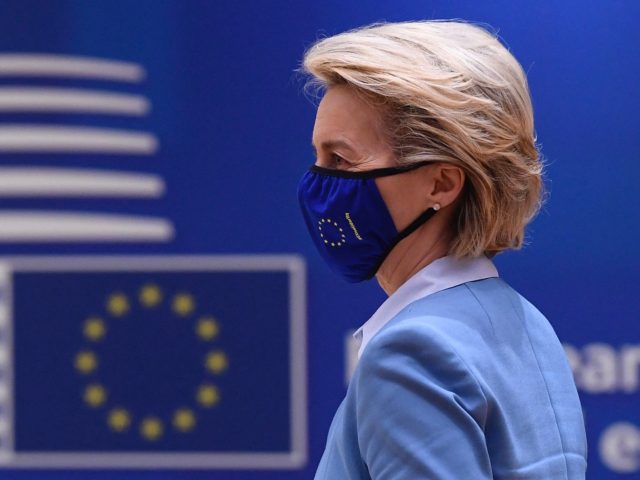The European Union will introduce a government-controlled and cross border “digital identity” app for EU citizens as a part of the bloc’s post-pandemic “transition”.
In a speech given to the EU’s 2021 Digital Assembly on Tuesday, European Commission President Ursula von der Leyen announced that Brussels is planning to develop a government digital wallet, saying: “We want to offer to Europeans a new digital identity.”
“It will allow everyone to control their identity online, and to interact with governments and businesses, across the EU,” von der Leyen said.
The top Eurocrat claimed that such a government system would protect individual privacy from big tech Silicon Valley companies, with the safeguarding of information being left up to the globalist institution.
“With our proposal, we are offering an alternative to the models of big online platforms. We believe in a human-centred digital transition,” the EU Commission leader said.
The EU digital wallet scheme is expected to be rolled out live sometime next year, according to a report from the Financial Times.
The app would store information on users, such as official documents like drivers licenses and passports, as well as payment details and passwords. The app would be able to be accessed with biometric data such as a fingerprint or retina scan.
The digital identity would give citizens the ability to access local government websites, pay utilities, and even rent cars in all 27 member states through the use of the centralised app.
While the scheme will reportedly be optional, sources involved in the project told the paper that those who sign onto the system will enjoy the “greater flexibility ideal for post-pandemic life”.
An EU source said the digital wallet would be “simple, secure and it will protect people online.
“People will also have the power to decide how much information they give out while Google and others don’t let you decide what you’re giving away.”
The announcement of the bloc’s intention to develop the digital wallet came as the European Commission declared that the gateway for the EU’s coronavirus digital passport scheme officially went live.
As of Tuesday, seven countries – Bulgaria, Czechia, Denmark, Germany, Greece, Croatia and Poland – have opted into the system. Other countries are expected to join in the coming weeks, with a full launch of the system expected by the beginning of July.
The QR code-based health pass contains information on whether a person has been vaccinated against COVID-19, tested negative, or recovered from the Chinese virus. The passport is available in either digital or paper format.
“The EU Digital COVID Certificate provides European citizens with a common tool to allow them to move freely and safely again. It showcases Europe’s technological leadership in full respect of our values and principles: data protection, inclusiveness, and proportionality,” the EU Commissioner for Justice, Didier Reynders said.
Upon announcing the scheme in March, President von der Leyen vowed that the vaccine passport will “respect data protection, security [and] privacy“.
However, the CEO of the online privacy company DeleteMe, Rob Shavell told Breitbart London that the EU chief shouldn’t make such “blanket statements” on the bloc’s ability to keep user data secure.
“Time and time again governments say that they are providing a data service to their citizens and claim that it will be protected, but what we see is this information ending up in data profiles available on Google searches,” Shavell said.
The DeleteMe CEO explained that data is becoming more difficult to keep secure because “the systems we have are too complicated and once that data gets digitised and out there and replicated in the country’s database that you are travelling to, with its own set of privacy protocols, you are looking at an expanding universe.”
Follow Kurt Zindulka on Twitter here @KurtZindulka

COMMENTS
Please let us know if you're having issues with commenting.